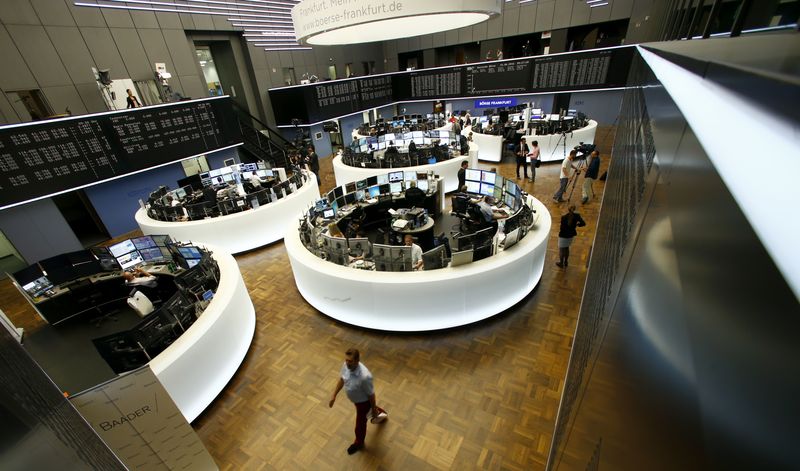United Homes Group stock plunges after Nikki Haley, directors resign
Investing.com - European stocks mostly edged higher Thursday, as investors digested a raft of corporate earnings, while awaiting several key regional economic releases.
At 03:05 ET (07:05 GMT), the DAX index in Germany climbed 0.2%, the FTSE 100 in the U.K. rose 0.2%, while the CAC 40 in France traded largely unchanged.
Corporate deluge continues
The second-quarter earnings season is approximately halfway through, and the deluge has continued Thursday, with a number of high-profile companies reporting.
Shell’s (LON:SHEL) adjusted earnings, its definition of net profit, came in at $4.3 billion in the second quarter, above expectations, but below the $6.3 billion seen a year ago.
The oil major added it would maintain the pace of its share buyback program at $3.5 billion over the next three months, the 15th consecutive quarter of at least $3 billion.
Anheuser-Busch InBev (EBR:ABI) reported a sharp jump in second-quarter underlying earnings as higher prices and expanding margins offset a decline in global volumes for the world’s largest brewer.
BMW (ETR:BMWG) maintained its full-year guidance, with the German auto giant holding strong against the threat of U.S. tariffs as the company’s large manufacturing presence in the country gives it an edge.
Unilever (LON:ULVR) beat market expectations for second-quarter underlying sales growth, with the consumer goods company helped by higher pricing.
Air France KLM (EPA:AIRF) reported higher second-quarter operating profit, with the carrier citing strong bookings for its premium services even as tariff concerns remain.
French electrical equipment maker Schneider Electric (EPA:SCHN) confirmed its 2025 outlook after reporting second-quarter revenue growth, buoyed by continued strong demand for its data centre offering.
ArcelorMittal (NYSE:MT), the world’s second largest steelmaker, reported quarterly earnings slightly above market expectations, but trimmed its forecasts for steel demand citing upcoming tariffs.
British American Tobacco (NYSE:BTI) reported a 1.7% rise in first-half profit at constant currency, beating expectations, helped by a return to growth of its business in the United States and demand for its Velo nicotine pouches.
Across the pond, artificial intelligence heavyweights Microsoft (NASDAQ:MSFT) and Meta Platforms (NASDAQ:META) both reported blowout quarterly results after the close on Wall Street Wednesday.
Results from tech giants Apple (NASDAQ:AAPL) and Amazon (NASDAQ:AMZN) are scheduled for release late Thursday.
Eurozone growth data due
On the European data slate, investors will digest inflation data from France, Germany and Italy, as well as the latest German and EU unemployment figures.
The ECB left its main interest rate unchanged at 2% last week, taking a break after a year of policy easing to wait for clarity over Europe’s future trade relations with the United States.
The Federal Reserve also decided to maintain interest rates at current levels on Wednesday, with the committee voting 9-2 on Wednesday to hold interest rates steady for the fifth consecutive meeting - two Fed governors dissented for the first time in more than three decades.
The Bank of Japan also left interest rates unchanged earlier Thursday, adding that it will hike interest rates in the future if the economy and inflation increase in line with its forecasts.
Elsewhere, China’s manufacturing activity shrank for a fourth straight month in July, an official survey showed earlier Thursday, suggesting a surge in exports ahead of higher U.S. tariffs has started to fade while domestic demand remained sluggish.
Crude eyes potential Russian sanctions
Oil prices slipped slightly lower Thursday, as traders weighed the surprise build in U.S. crude stocks and the weak Chinese economic data, with the potential for lower supplies on Russian sanctions.
At 03:05 ET, Brent futures slipped 0.3% to $72.26 a barrel, and U.S. West Texas Intermediate crude futures fell 0.2% to $69.88 a barrel.
Both benchmarks settled 1% higher on Wednesday, spurred chiefly by Trump’s threat to impose steep tariffs on major buyers of Russian crude, in a bid to pressure Moscow into ending its war against Ukraine..
U.S. crude oil inventories rose by 7.7 million barrels last week, the Energy Information Administration said on Wednesday, with analysts having expected a 1.3 million-barrel draw.
Additionally, the weak Chinese activity data ramped up concerns of future demand from the world’s biggest oil importer.
